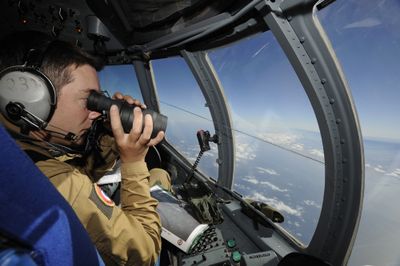Plane wreckage found
Search continues for black boxes

FERNANDO DE NORONHA, Brazil – An airplane seat, a fuel slick and pieces of white debris scattered over three miles of open ocean marked the site in the mid-Atlantic on Tuesday where Air France Flight 447 plunged to its doom, Brazil’s defense minister said.
Brazilian military pilots spotted the wreckage, sad reminders bobbing on waves, in the ocean 400 miles northeast of these islands off Brazil’s coast. The plane carrying 228 people vanished Sunday about four hours into its flight from Rio de Janeiro to Paris.
“I can confirm that the 5 kilometers of debris are those of the Air France plane,” Defense Minister Nelson Jobim told reporters at a hushed news conference in Rio. He said no bodies had been found and there was no sign of life.
The effort to recover the debris and find the black box recorders, which emit signals for only 30 days, will be challenging.
“We are in a race against the clock in extremely difficult weather conditions and in a zone where depths reach up to 7,000 meters,” French Prime Minister Francois Fillon told lawmakers in parliament Tuesday.
The cause of the crash will not be known until the black boxes are recovered. Weather and aviation experts are focusing on the possibility of a collision with a brutal storm that sent winds of 100 mph straight into the airliner’s path.
But several veteran pilots of big airliners said it was extremely unlikely that Flight 447’s crew intended to punch through a killer storm.
“Nobody in their right mind would ever go through a thunderstorm,” said Tim Meldahl, a captain for a major U.S. airline who has flown internationally for 26 years, including more than 3,000 hours on the same A330 jetliner.
“They may have been sitting there thinking, ‘We can weave our way through this stuff,’ ” Meldahl said. “If they were trying to lace their way in and out of these things, they could have been caught by an updraft.”